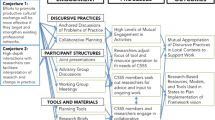Abstract
PLATO is conceived as a research initiative among multiple German universities and research institutes, and cooperating universities and researchers globally. PLATO investigates the representation of information on the Internet and social media and its effects on students’ positive learning as a vital, scientifically, morally, and ethically oriented learning approach in a knowledge society. Yet PLATO is in search of its identity. Research projects are tangentially and variably aligned with its interdisciplinary and inter-university mission. Organizational and financial commitment, leadership and research coherence is illusive especially when many universities led by Johannes Gutenberg University of Mainz are involved. An identity is proposed herein where research and development (R&D) would take place in “Pasteur’s Quadrant”: R&D in “use inspired basic research.” From this perspective, an organization for PLATO, one possible vision, is sketched that includes leadership, research areas, and public outreach where research meets practice and vice versa.
Access this chapter
Tax calculation will be finalised at checkout
Purchases are for personal use only
Similar content being viewed by others
References
German Research Foundation (DFG). (2016). Call for proposals in the Clusters of Excellence and Universities of Excellence. Retrieved August 27, 2018, from http://www.dfg.de/download/pdf/foerderung/programme/exzellenzstrategie/schedule_excellence_strategy.pdf
Johannes Gutenberg-University Mainz (JGU). (2016). Draft proposal for the establishment and funding of the Cluster of Excellence: Positive Learning Typology (PLATO). Mainz: Johannes Gutenberg-University Mainz.
Stokes, D. E. (1997). Pasteur’s Quadrant – Basic science and technological innovation. Brookings: Institution Press.
Zlatkin-Troitschanskaia, O., Schmidt, S., Molerov, D., Shavelson, R. J., & Berliner, D. (2018b). Conceptual fundamentals for a theoretical and empirical framework of positive learning. In O. Zlatkin-Troitschanskaia, G. Wittum, & A. Dengel (Eds.), Positive learning in the age of information – A blessing or a curse? (pp. 29–52). Wiesbaden: Springer.
Zlatkin-Troitschanskaia, O., Wittum, G., & Dengel, A. (Eds.). (2018a). Positive learning in the age of information – A blessing or a curse? Wiesbaden: Springer.
Author information
Authors and Affiliations
Corresponding author
Editor information
Editors and Affiliations
Rights and permissions
Copyright information
© 2019 Springer Nature Switzerland AG
About this chapter
Cite this chapter
Shavelson, R.J. (2019). PLATO in Search of Identity. In: Zlatkin-Troitschanskaia, O. (eds) Frontiers and Advances in Positive Learning in the Age of InformaTiOn (PLATO). Springer, Cham. https://doi.org/10.1007/978-3-030-26578-6_20
Download citation
DOI: https://doi.org/10.1007/978-3-030-26578-6_20
Published:
Publisher Name: Springer, Cham
Print ISBN: 978-3-030-26577-9
Online ISBN: 978-3-030-26578-6
eBook Packages: EducationEducation (R0)




